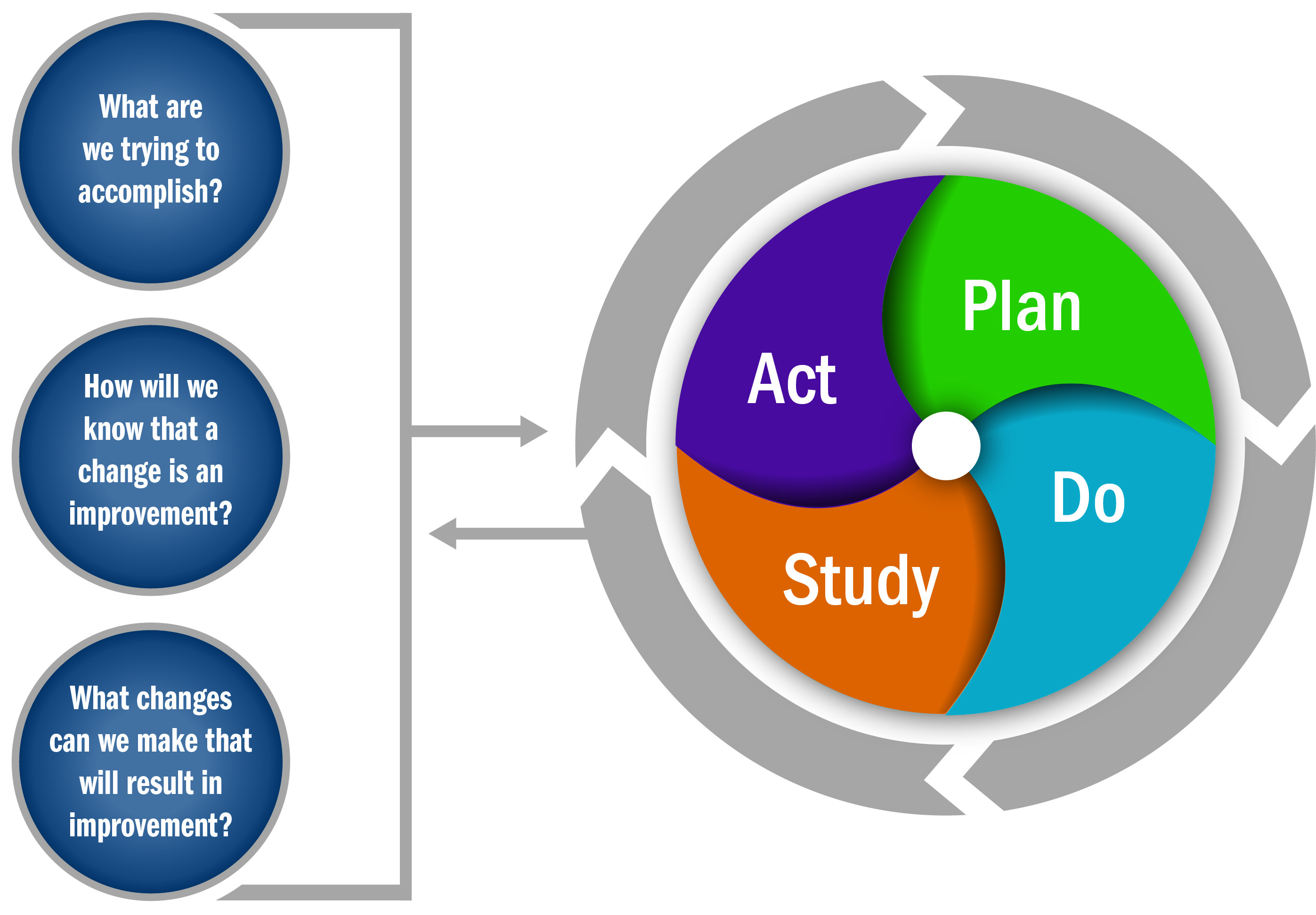Using Networked Improvement Communities to Improve Educational Practice
What does it take to improve education at the school and district levels? Collaboration, coordination, and intentional change-making.
It takes real-world, face-to-face partnerships among a variety of stakeholders at the school, district, and state levels, with support from researchers. When a school or district notices an issue—for instance, its achievement gaps aren’t closing in math or literacy—bringing these stakeholders to the table allows for real conversations, real changes, and real improvement.
A networked improvement community (NIC) is just this: a group of stakeholders from diverse backgrounds solving problems together using the tools of improvement science, specifically Plan-Do-Study-Act cycles.
The cycle consists of four stages:
1. Identify specific areas of need (Plan).
2. Intervene to improve supports to address those needs (Do).
3. Measure any changes that occur (Study).
4. Refine the intervention (Act).

By using Plan-Do-Study-Act cycles, stakeholders can learn from one another about what works, for whom, and why.
Why AIR?
Our experts have studied the effectiveness of Networked Improvement Communities and continuous improvement and know what works and what might not. We have deep experience in serving as the “hub” or “backbone” of NICs focused on a wide range of topics, including supporting student growth in math, literacy, and STEM subjects. We believe that by including your stakeholders from the start—developing measures and collecting data together—everyone will be engaged not only throughout the improvement process, but will take ownership of it.
Our researchers and technical assistance experts—many of whom are former teachers and leaders in districts around the country—work closely to provide you not only with evidence-based best practices, but to support your implementation of them.
A Selection of AIR’s NIC Work
NIC Facilitation and Technical Assistance
Reaching All Students Through Language and Literacy Project
AIR is supporting the Ohio Department of Education and Workforce by providing professional development on literacy and improvement science to 25 districts from across the Buckeye State. The project supports districts with learning instructional practices aligned with the state’s plan to raise literacy achievement and apply it through a project designed to improve student literacy outcomes. During the first year (2023–24), district teams formed a Network Improvement Community (NIC) and received professional development in literacy instruction through a partnership between AIR and Boston University. In year 2 (2024–25) of the project and with coaching from AIR staff districts are developing, implementing, evaluating, and disseminating findings from their improvement projects addressing a range of problems of practice related to equity in literacy instruction.
Long Beach Network for School Improvement (LBNSI)
AIR supports an NSI at Long Beach Unified School District (LBUSD), focused on supporting teams of middle school teachers. For three years, this randomized controlled trial consisted of 10 middle schools, and now include 20 middle schools from across the district. AIR coaches are working with teams of ELA, History, and Math teachers in grades 6, 7, and 8 to use improvement science and evidence-based strategies to increase outcomes for Black and Latino/a students and eighth graders from low-income households by increasing the number of students who are “on-track” or high school ready, and who meet or exceed ELA/literacy and math proficiency on the CASPP.
Flint Network for School Excellence
The Flint Network for School Excellence is a group of 8 elementary schools in Flint, Michigan working together to increase the percentage of students who are achieving growth and proficiency in their math and literacy skills. This networked improvement community was founded in 2023 by the Flint Center for Educational Excellence, who partnered with AIR. AIR is working with school leaders, coaches, and teachers to facilitate continuous improvement cycles focused on equitable instruction in math and literacy and on engaged learning environments.
Florida Network for School Improvement (FNSI)
The Florida Network for School Improvement is a community of schools focused on improving math proficiency for Black and Latino/a students and students experiencing poverty. Participating schools work together to address challenges related to student outcomes by employing continuous improvement cycles that aim to identify, test, and refine instructional strategies.
The Learning and Re-envisioning Network (LRN)
AIR is working in partnership with the Chicago Public Schools Community Schools Initiative to re-envision the needs assessment, progress monitoring, service planning and continuous improvement processes for CPS Community Schools. AIR coaches work directly with school-based coordinators to implement and collect data to support a process based in improvement science and PDSA cycles to support continuous improvement of implementation of community school initiatives. Learn more about this project and AIR’s community schools work.
Regional Educational Laboratories (REL) Midwest – Credit Recovery and Learning and Technology NICs
Through funding from the Institute for Education Sciences, REL Midwest established and led two NICs in Minnesota and Iowa to improve outcomes for all students. The Minnesota Credit Recovery Networked Improvement Community brought together staff from alternative education high schools in two urban and two rural school districts in Minnesota over the period of 3 years to improve the rates of credit recovery for high school students. AIR conducted coaching sessions with each school, both virtual and in person, to support the development and implementation of PDSA cycles with staff in all subject areas. The Iowa Learning and Technology Networked Improvement Community brought together rural districts in Iowa, and the area education agency that serves those districts, to engage in inquiry cycles to identify effective ways of integrating technology into instructional practice.
Student-Centered Assessment Network (SCAN)
SCAN is focused on improving the use and effectiveness of student-centered formative assessment practices in high schools, and includes teachers from Rhode Island high schools. AIR helps teachers develop, implement, test, and refine practices in their classrooms.
Beyond Accountability Networked Improvement Community
Beyond Accountability is a NIC focused on improving teacher evaluation systems to better support teacher practice in four districts in the Southeast. Through a series of within-district and cross-district meetings, AIR has worked with each district team to identify context-specific challenges related to their teacher evaluation and professional support systems and to develop and test solutions to those challenges.
Michigan Focus Networked Improvement Community
During the 2015–16 school year, REL Midwest at AIR and school leaders in Michigan convened a NIC to reduce inequality in schools with the largest achievement gaps. The group engaged in Plan-Do-Study-Act cycles to determine the root causes of inequality and implement a change in practice to address those causes.
100Kin10
AIR is supporting two NICs in conjunction with 100Kin10 to address the challenge of increasing the reach and quality of engineering and computer science education in New York. Each NIC comprises nine to 10 organizations committed to building a shared understanding of what works, for whom, and under what conditions. AIR supports participants in developing measures and collecting and analyzing data to inform their ongoing improvement efforts.
Better Math Teaching Network
In 2015, AIR developed the Better Math Teaching Network—a collaboration among researchers at AIR and mathematics teachers and instructional leaders across New England who are committed to improving teachers’ capacity to engage in student-centered mathematics teaching. As the network lead, AIR guides participants through continuous improvement cycles, with the aim of improving student-centered mathematics instruction, providing more equitable access to student-centered mathematics learning opportunities, and improving student engagement and problem-solving skills. AIR researchers contribute their expertise in continuous improvement research methods and their deep knowledge of student-centered mathematics instruction.
Student Agency Networked Improvement Community
AIR, in partnership with New Tech Network, launched the Student Agency NIC with four Midwestern districts. The purpose of the NIC is to identify instructional strategies that promote different aspects of student agency (e.g., self-efficacy, self-regulated learning, and persistence). The NIC also will explore whether the strategies are equally helpful for different subgroups of students. AIR will work with the NIC members to build their capacity to develop formative measures of student agency and to systematically test whether the instructional strategies are associated with increasing student agency. Through the NIC, members will plan to scale the evidence-based strategies they identify.
NIC Research and Evaluation
Student Agency Networked Improvement Community (2017–2019)
AIR, in partnership with New Tech Network, launched the Student Agency Networked Improvement Community which brought together four Midwestern school districts to identify instructional strategies that promoted different aspects of student agency (e.g., self-efficacy, self-regulated learning, persistence). AIR served as the primary research partner to explore whether the strategies tested in the NIC were equally helpful for different subgroups of students. AIR worked with the NIC members to build their capacity to develop formative measures of student agency and to systematically test whether the instructional strategies were associated with increasing student agency.
Empowering 5-K Teachers in Southern Oregon Through Computational Thinking Networked Improvement Community
In partnership with Southern Oregon University, AIR served as the primary evaluator and technical support for the Empowering 5-K Teachers in Southern Oregon through Computational Thinking Networked Improvement Community. AIR’s evaluation provided formative information for the development and continued implementation of a Networked Improvement Community for K-5 teachers in the Ashland and Phoenix/Talent area school districts to improve their understanding of computational thinking and improve their abilities to implement CS strategies in the classroom.
Network to Transform Teaching
The National Board for Professional Teaching Standards launched the Network to Transform Teaching in 2013 to improve student achievement in high-needs schools through access to National Board–certified teachers. AIR is studying the implementation and efficacy of this NIC at 10 sites.
Supporting Teacher Effectiveness Project
AIR serves as the data and measurement partner for the Supporting Teacher Effectiveness Project. Through this work, AIR builds district and charter management organization capacity to use data to identify potential positive deviant practices and test whether those practices are associated with similar positive gains in student outcomes across classrooms.
